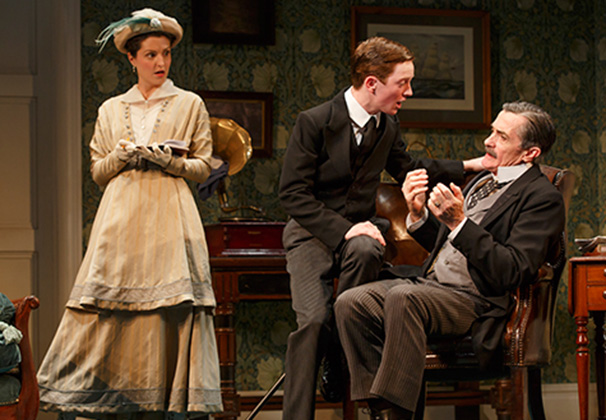
“Let right be done.”
These are the words of a fiercely devoted father when his youngest son is accused of theft. The words are repeated by the boy’s headstrong sister when she is forced to choose between her fiance and her family. The motto also drives the family’s lawyer when he defends the boy in court — a case with unexpected consequences for his political career.
The catalyst for all the trouble is 14-year-old Ronnie Winslow, who spends two hours tearfully protesting his innocence in Roundabout Theatre Company’s new production of “The Winslow Boy.” However, it wouldn’t be accurate to say the play is about Ronnie. The story also focuses on his family members and the tension the trial causes at home. The entire play takes place in the Winslow parlor, and the trial is reduced through expository dialogue.
Containing what could have been a courtroom drama in the home of the defendant is clever, but unfortunately the staging is one of the weaker points of the play. The family makes several personal and monetary sacrifices as the trial drags on, but it’s hard to tell by looking at the home and its inhabitants. The parlor remains immaculate from beginning to end, showing no signs of want or wear, and the family members remain well-dressed and well-fed. The lack of change trivializes the family’s ordeal and even demeans their personal plights.
The performances are commendable, but they awkwardly swing between high tension and uninspired chatter. The climaxes of each scene come off as rigorously rehearsed, while the build-up is left relatively untouched. However, the cast succeeds in capturing the warmth of a family — there’s a particularly sweet moment when Catherine (Charlotte Parry) and the elder brother, Dickie (Zachary Booth), tease each other as they dance in the parlor.
Roger Rees, a Tony Award-winner for his role as the lead in “The Life and Adventures of Nicholas Nickleby,” is staunch and loving as the father, Arthur Winslow, but he is less convincing when wracked by guilt. Likewise, Parry exudes strength but stumbles when emotional stress comes into play. Alessandro Nivola achieves more success as the family’s lawyer, Sir Robert Morton. The role doesn’t demand much emotional range, leaving Morton one-note through most of the play. But there are moments at the end of each act where the character displays unexpected degrees of intensity, and Nivola delivers them effectively. However, the most enjoyable performances come from Booth and a wonderful Mary Elizabeth Mastrantonio, who both transition from humor to drama more smoothly than their colleagues.
Audiences may want to see “The Winslow Boy” for its intriguing story, Edwardian time period and “Downton Abbey”-esque dialogue, but unfortunately this production doesn’t pack the punch it should. It will entertain viewers while they are watching the production, but they will likely forget the show soon after the curtain drops.
A version of this article appeared in the Wednesday, Nov. 6 print edition. Suzanne Egan is a staff writer. Email her at [email protected].























































































































































